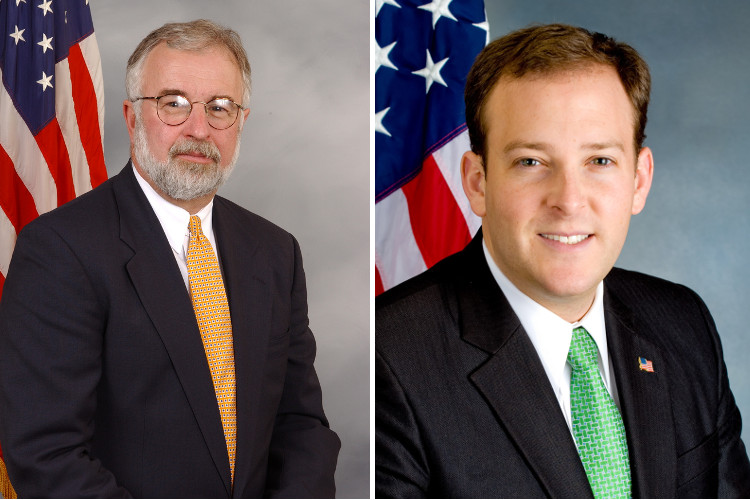The Mideast may be thousands of miles away from the East End, but the escalating violence there has moved into the foreground as an issue in the hotly contested Congressional race pitting the Democratic incumbent, Rep. Tim Bishop (D-Southampton), against his Republican challenger, state Sen. Lee Zeldin (R-Shirley).
The two men faced each other in 2008. This time, Zeldin is hoping for a different result, although national polling lists the First Congressional District as “leaning Democratic.” Zeldin’s campaign has issued statements critical of President Barack Obama’s Mideast policy for being too harsh on Israel and too soft on the Palestinian Authority, and by extension he’s tried to portray Bishop as being in lock-step with his party’s president. Whether there’s a significant policy divide between the two Suffolk politicians is open to debate.
What’s not in dispute is that the news from the volatile region has grown increasingly bleak. Israel’s military strikes have killed more than 200 people in Gaza including women and children—most recently a group of boys swimming on the beach—with air-strikes, according to The New York Times. Hamas has launched more than 1,000 rocket attacks on Israel from Gaza, causing two deaths, according to the Israeli Defense Force. And international aid workers report that deteriorating conditions risk becoming a humanitarian crisis in Gaza, where Israel launched a ground offensive amid the latest military confrontation after a brief cease fire collapsed.
In interviews with the Press, neither Bishop nor Zeldin wanted to discuss that situation on the ground. Both preferred to focus on their unwavering support for Israel. You’d be hard-pressed to find anyone in Washington that doesn’t support Israel.
The recent outburst of violence began on June 30, when the bodies of three Israeli teens who’d been missing for two weeks after they’d been abducted on the West Bank were found buried in shallow graves. Israeli Prime Minister Benjamin Netanyahu blamed Hamas, the militant Palestinian group that runs Gaza, calling the teens’ murderers “wild beasts.” Then on July 2, a 16-year-old Palestinian teenager sitting outside a mosque in East Jerusalem was kidnapped by a group of Israelis, who later burned him alive and left his body in the Jerusalem Forest. Six Israelis were arrested—three reportedly confessed; they haven’t been identified. No arrests have been made in the deaths of the three Israeli teens.
In his official statement, Bishop said: “President Lyndon Johnson once opined that ‘Peace is a journey of a thousand miles and it must be taken one step at a time.’ I am deeply troubled by the current conflict between the Israelis and the Palestinians. In order for long-term peace to be achieved in the region, all sides must be willing to work together toward a common goal. The violence must end, and efforts to restore hope for peace and stability in the Middle East must resume with a renewed sense of urgency. A step towards a new future for Israel and Palestine must be taken; and it must be taken now.”
In his campaign press release, Zeldin said: “Three innocent adolescents were recently buried in the prime of their lives. Eyal Yifrach, Naftali Fraenkel and Gil-Ad Shaer were victims of ruthless terror largely thought to have been perpetrated by Hamas. While Hamas has not claimed responsibility, they have praised the attack.”
Asked why he didn’t mention the 16-year-old, Zeldin told the Press that what happened to the adolescent was “absolutely horrific,” adding that he was “very encouraged to see how quickly the Israeli government condemned the attack by one of their own.” By contrast he criticized the Palestinian Authority for not excoriating Hamas for its actions. “Hamas is firing rockets and mortars into Israel and [has been] engaging in terrorist acts for a long time,” he said.
“I am deeply concerned with the role that the president and his administration are playing with regards to this conflict,” Zeldin said. “I have a deep concern with the alliance between the Palestinian Authority and Hamas, and I believe that U.S. taxpayer dollars should not be spent on the Palestinian Authority as long as this alliance with Hamas continues.”
Bishop, when asked to elaborate on his position, noted the differing reactions to the tragedies.
“All four murders are tragedies,” Bishop told the Press. “They represent a kind of behavior that is depraved and has no place in a civilized world. I think that the fact that Israel has spoken out so forcefully in condemnation of the murder of the young Arab boy and so swiftly took into custody those that they believe are responsible for it marks a dramatic distinction between the government of Israel and why it is so worthy of support and Hamas, which is running Gaza, and is presumably responsible for the kidnapping and murder of the three Israeli boys. There has been no condemnation issued by the leadership of Hamas. There has been no effort that I’m aware of to find those responsible and bring them to justice. And so the response of Israel is an appropriate civilized and meaningful response. The response of Hamas is the polar opposite.”
Zeldin blamed Obama for enabling those differing reactions.
“One of the things that concerned me in watching the president’s response to the three Israeli boys being kidnapped and then murdered is that the president was asking for patience on the part of Israel, [and] praising the leadership of the Palestinian Authority,” Zeldin said. “It just blows my mind to see what is essentially the exact opposite response as to what we need there. The Israeli people are by far our strongest ally in that region if not the entire world.”
“The people want to know where we stand on domestic and foreign policy issues,” Zeldin told the Press. “Maybe he [Bishop] believes that the president is handling the situation perfectly and he has no criticism, or maybe he does have some criticism and if so, he should share it so we know where there’s space between him and the president. I’m not aware of there being any space between him and the president.”
Bishop adamantly defended his foreign policy.
“I don’t think you’re going to find anyone—any reasonable person, let’s put it that way—who can question with any degree of accuracy, my steadfast support for the State of Israel and for its people and for the U.S.’s role in helping to protect its safety and security,” he said.
Neither Bishop nor Zeldin, who is Jewish, have been to Israel. The state senator hopes to visit Israel for the first time “as a Congressman,” assuming he wins the race. When Zeldin was on active duty with the U.S. Army, he went to Turkey, Kuwait and Iraq. He said that Obama’s making John Kerry the Secretary of State was a “mistake.”
Asked about the encroachment of Jewish settlements in the West Bank, which the Palestinian Authority has wanted Netanyahu to roll back and United Nations Secretary-General Ban Ki-moon has called “illegal under international law,” Zeldin declined to criticize Israel.
“There are issues to be addressed on both sides of the table but any type of concession made on any front by the Israelis should be done to obtain a more stable future in the weeks and months following any type of agreement,” Zeldin said. “I wouldn’t suggest that the Israelis start negotiating against themselves if things aren’t going to become any better.”
Bishop also declined to criticize Israel.
“I would say that our principle obligation is to help provide the context, the environment, in which settlement talks can proceed in a productive fashion,” said Bishop. “I think we have to be the catalyst for those talks. If we can get the larger issue resolved, the other issues that flow from the larger issue will also get resolved.
“The big picture is there is only one solution here and that’s a two-state solution,” the Congressman continued. “Both parties are going to have to move outside their comfort zone to achieve that outcome.”
When Zeldin first ran against the incumbent, Bishop said, “I can’t remember any significant disagreement between him and me on issues relating to Israel and the conflict. Who knows? It may come up.”
As for how much traction this issue will have on Election Day, Suffolk Democratic Chairman Rich Schaffer told the Press, “I would say that people are generally concerned about the violence [there] and people would want to hear from each candidate as it is an important issue. I am not sure how much of a determining factor it would be…”
Suffolk Republican Chairman John Jay Lavalle predicted it would have an influence “to a certain degree.” The difference in the candidates’ viewpoints, he said, will show that the incumbent is not “an independent guy,” LaValle said. “He’s going to end up supporting a failed presidential agenda when he shouldn’t be…Tim Bishop’s in a very difficult spot.”
Perhaps, but perhaps not.




























